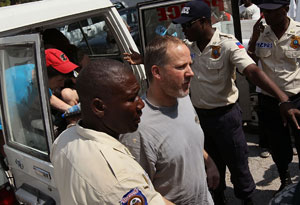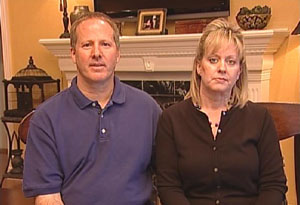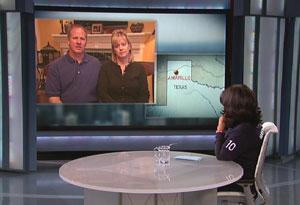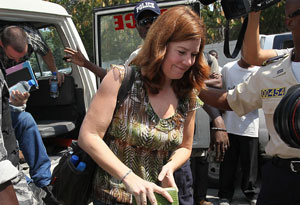Jim Allen's First Interview

Photo: Getty
On January 29, 2010, 10 American missionaries were arrested in Haiti after trying to leave the country with 33 children they claimed were orphans. The missionaries, who said they were headed to an orphanage in the Dominican Republic, were charged with child abduction and put in jail.
Haitian authorities launched an investigation and found that some of the children actually had parents, but some of those Haitian parents testified last week that they had willingly handed over their children to the Americans in hopes of securing their kids a better life.
On February 17, a judge freed eight of the 10 missionaries. One day later, they came home.
Haitian authorities launched an investigation and found that some of the children actually had parents, but some of those Haitian parents testified last week that they had willingly handed over their children to the Americans in hopes of securing their kids a better life.
On February 17, a judge freed eight of the 10 missionaries. One day later, they came home.

Jim Allen is one of the eight Americans who was released from the Haitian prison. Jim says he originally decided to go to Haiti because he felt he was in a position to help after the devastating earthquake. "I had some construction skills, some experience. I felt like I could leave my job for three or four weeks and I could go over there and use these skills and experience to help the Haitian people," he says. "When I first left, I didn't know what to expect. My intentions were I knew I had some skills I thought I could use and I could go and do that or whatever else was asked of me. Basically, I just felt the need to help them."
Jim says he traveled with his group to a number of orphanages around Port-Au-Prince. During those visits, Jim says they were introduced to children who were said to have no home or parents to go home to. He says one of the orphanage directors asked if they could take the children and try to help them. "As we got their name and their birth dates, we wrote those down and they got on our bus and we started taking care of them, basically," he says. The plan, he says, was to take the children to a restored hotel in the Dominican Republic that had been set up as an orphanage.
Jim says he traveled with his group to a number of orphanages around Port-Au-Prince. During those visits, Jim says they were introduced to children who were said to have no home or parents to go home to. He says one of the orphanage directors asked if they could take the children and try to help them. "As we got their name and their birth dates, we wrote those down and they got on our bus and we started taking care of them, basically," he says. The plan, he says, was to take the children to a restored hotel in the Dominican Republic that had been set up as an orphanage.

Jim says when ending up in jail was quite a shock, but it was manageable. "It was hard, but they treated us as well as they could with what they had," he says. "We slept on the concrete floor, but there were a lot of times where you'd think, 'We have a roof over our head; we have one meal coming to us, and it's a hot meal,' and it was actually enjoyable and good. There were a few nights when it would rain and we're laying there and the water's dripping in, just through little holes in the ceiling, and what I was thinking of at the time is that there were a million, it seemed like, people on the street. They were getting poured on and they were sleeping on the ground."
Jim's wife, Lisa, says she never doubted that her husband would come home soon. "I thought when they get an opportunity to share their story, then they'll see that they were there for good intentions," she says. "But you can't help but be concerned with that situation."
Jim's wife, Lisa, says she never doubted that her husband would come home soon. "I thought when they get an opportunity to share their story, then they'll see that they were there for good intentions," she says. "But you can't help but be concerned with that situation."

Photo: Getty
Since this story broke, there have been allegations in the media that the group leader, Laura Silsby, intended to make a profit on the children by charging large fees to get them placed. Jim says he doesn't know anything about those claims. "I didn't know Laura or any of the other group except for two members going into this. I met them in the Miami airport on the way over there," he says. "I didn't get any indication myself that anything like that was going on. It seemed like everyone in the group was legitimately concerned about the children and helping them."
Jim says a separate claim, that eight of the members of his group signed a note saying they were misled by Laura Silsby and that it was slipped to a television producer, is false. "That is a complete fabrication," he says. "I know that what went on with the five men—because we were together and the women were separate—we had no ill feelings toward anybody. We were all kind of part of this group and had the same intentions."
Jim says a separate claim, that eight of the members of his group signed a note saying they were misled by Laura Silsby and that it was slipped to a television producer, is false. "That is a complete fabrication," he says. "I know that what went on with the five men—because we were together and the women were separate—we had no ill feelings toward anybody. We were all kind of part of this group and had the same intentions."

Despite the misunderstandings, Jim says he has no ill feelings toward the Haitian authorities for putting him in jail. "When we were put in detention, it was a real shock at the moment and it was real hard to process that, but they treated us well," he says. "They were doing the best they could, and they were going through the legal process. It's different than ours, completely different than what we are used to here. ... I felt like as soon as the story was told and the facts come out that we had done nothing wrong, that I would be coming home. I just didn't know when that would happen."
What Wyclef Jean saw in Haiti
What Wyclef Jean saw in Haiti



